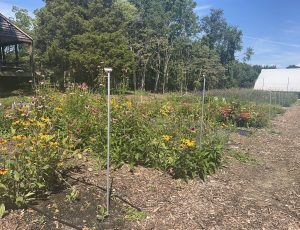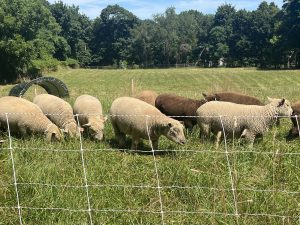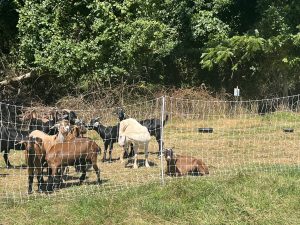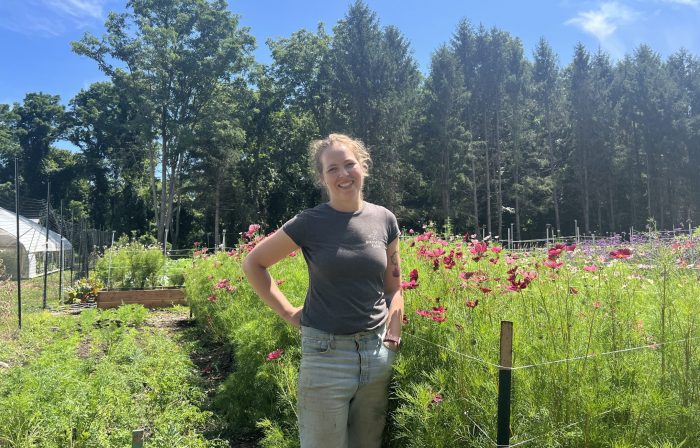By Leah Chiappino
Nestled off of Shep Jones Lane in Head of the Harbor, is Avalon Nature Preserve’s newest addition: Birdsfoot Farm.
Increasingly known to locals for its Saturday farmstand, with offerings that include whole chickens, as well as farm-grown flowers and vegetables, its main mission, consistent with the preserve, is to restore the farm’s land to its natural ecosystem.
“I wanted to use animals in the transformation of this land,” Annalee Holmdahl, the farm’s manager, said.

The farm was purchased by the preserve in 2018. Its land has been under the Suffolk County Farmland Preservation Act since the 80s, which mandates it be used for agricultural purposes, explained Avalon’s Executive Director, Katharine Griffiths.
“The property had been on our radar for a while,” she said, noting it is adjacent to Avalon.
Farming wasn’t on Griffiths’ radar until Birdsfoot’s land came along, and Avalon was mandated to conform to the terms of its deed.
“We had to shift and come up with a plan and a farming strategy that met our mandate and also fit our philosophy to protect, restore, inspire,” she said. “It fits in that. It’s not exactly what we’ve done historically, but I think what we’re doing on the farm fits that philosophy.”
It wasn’t until July of 2022 that the farmstand was able to open on Saturdays. In developing the farm, they started with bees and then acquired egg-laying birds. Once Holmdahl, who lives on the property with her Rough Collie, Maisy, got on board, in February of 2022, they brought sheep and goats in, and developed the hoop houses on the property, along with the flower and vegetable gardens.
“We did not want to do too much because we didn’t have a lot of manpower, but just started to dabble and just see what sort of response we were getting,” said Griffiths.
The farm has only a few full-time staff. Holmdahl focuses on the garden and planning projects for the farm.
Holmdahl earned a degree in Neuroscience and made her way around the country farming. A native of Washington state, she started farming in California, with a focus on goat, sheep, and dairy farming, before moving on to vegetable farming in Montana, and livestock farming in Georgia and in upstate New York. Then, she landed at Birdsfoot. Living on the property “feels necessary,” Holmdahl said. A few additional farmhands work part-time.

Photo by Leah Chiappino/TBR News Media
“Every once in a while, in the morning you wake up and you hear the sheep and you’re like that’s the wrong direction, they’re not where they’re supposed to be,” she joked. It’s a 24/7 job for Holmdahl. “I make sure I get away a little bit,” she said.
Livestock Manager Ryan Lertora cares for the animals.
In staying true to its mission, the farm tries to use its animals however it can. Its Southdown babydoll sheep eat the grass, its Spanish goats eat underbrush along the hedgerows, and its vegetables are often snacks for the chickens. The breed of goats was selected specifically because they are known for land clearing, up to six feet, of brush, and the sheep, who are often used in vineyards and orchards were picked for their grazing abilities as well as the fact that they can’t reach the produce due to their small size.
The farm’s 13 goats have been moving down the hedgerows of the Birdsfoot’s pasture since they came outside in the Spring. In the winter, they stayed in the hoop houses. They are only female, and as such have no partners to produce milk. They are surrounded by a temporary electric fence to keep them from wandering. Simplicity is key to having the goats maximize their benefit to the land, Lertora said. “Part of the way to use the animal to their best is to keep them in a smallish area and concentrate on their purpose and then move them along,” he added
While there are other ways to clear the brush, the goats offer unique results. “There are definitely faster ways of clearing brush obviously, people and mechanical means, but it is nice to use the goats,” Holmdahl said. “They kind of can do a preliminary clean first where we can see what’s really in there.”

The livestock, which also includes both meat and laying hens, as well as turkeys, also frequently rotate their locations in the pasture. While surrounded by the same temporary electric fences to keep them from wandering, they can follow their natural behavior. The meat and laying hens are in separate sections of the farm. The laying hens share their space with two roosters, and despite the uptick in local roosters needing homes, it’s difficult to acclimate more into the flock. They along with the turkeys have freshly built coops in the pasture.
The farm doesn’t have quite enough turkeys to sell, so last year they gave them all to Avalon staff, for Thanksgiving.
Despite the animals giving back to the land, and the land giving back to the animals, the work to care for them is still substantial, said Lertora. “It might be misleading because there’s mostly open empty space here,” he said. “But it turns out that it’s quite a bit of work for everybody, collecting eggs, giving everybody the right amount of feed and then moving them to pasture,” he said.
The sheep have also been sheared, though the wool needs to be sent to a mill after the farm decides on what its final project will be. Holmdahl wants to eventually train Maisy, who was purchased for the farm from a breeder in Pennsylvania, to formally herd the sheep. They also graze without damaging the grass.
“They rip what they’re eating,” said Holmdahl. “They don’t bite the way we bite. But it’s actually really good for the grass that it’s not being bitten.”
The rotational grazing allows goats and sheep to experience new foods and helps prevent them from overindulging. It also helps restore the soil, which is in poor condition on the property, by increasing its carbon levels. The animal’s benefits feed off each other. When the sheep eat the top of the grass and put down manure, it gives the poultry the opportunity to distribute the manure, and spread it throughout the pasture, transplanting the carbon into the soil.
“We’re working very hard to restore the soils on the property that are quite poor,” Griffiths said “So, the animals are a nice way for us to do pasture maintenance and help improve our organic matter.”

The improvement in soil health won’t just be shown by tests, but rather by the farm’s ecological health such as the numbers of different wildlife, products, and plants on the farm, said Holmdahl.
Rescue Jumbo Pekin Ducks also call the farm home, though they stay more stationary due to needing protection from predators, and occasionally lay eggs. They also have golden-layer ducks that do lay eggs.
“It’s slowed down significantly recently,” Holmdahl said. “I think it’s because of the hot weather or they’re old or they’re laying their eggs and we can’t find them.”
On the farm they also practice cover cropping, covering soil when not in use, and low-till farming, as well as using compost and rotting plants. The garden products include eggplants, tomatoes, cucumbers, peppers, carrots, berries, and farm-fresh flowers. The flowers make up a large portion of the farm’s inventory, and Holmdahl tries to grow good pollinators. They have ramped up production of vegetables, like squashes and kale, and lettuces, with the goal of donating the excess. Local churches, through Island Harvest, are able to pick up a cooler of the vegetables each week.
The challenge growing vegetables on the property, Holmdahl said, is that while the farm is a large chunk of land, the garden is “barely a third of an acre.” She loves growing tomatoes, a huge part of her background, she said, and they have been successful on the farm. Other products took trial and error.
“We did hot peppers last year and this year we’re trying sweet peppers, which have varying degrees of success,” she said. “We tried watermelons this year. They didn’t do so well…I try to focus on the things that I can get a lot out of in this area.”
Holmdahl has tried to grow some pumpkins for the fall, but is limited due to the space. So, products like lettuce, which can grow in succession, are the most practical.
The poor soil health has also been a challenge, Holmdahl said. “You see it when you have a lot of bug damage because the soil isn’t actually healthy enough to keep the plants healthy,” she added.
The decline in soil quality is due to the fact the land hasn’t been farmed consistently since the 80s, Holmdahl said, so nothing was really being done to keep up its quality.
“We’re lucky because overall the quality of soil on Long Island is great,” Holmdahl said. “So there’s total potential. By planting things and adding more compost and trying to do the best we can with what we have, and then adding soil when necessary, hopefully, we can get the quality up and we can also cultivate a good environment where beneficial bugs are around and that will help everything.”
Additional projects are ahead. Honey is going to begin to be sold, and restoration of barns on the property will begin. They are also building an animal barn, and a head house, for staff to wash and pack vegetables, as well as to arrange flowers.
Though it will take several years, they hope to connect the access roadways in Avalon so the public can walk through and see a working farm, which is presently only open to the public on Saturdays during farmstand hours.
“It’s a lot of trying to control the flow of people and also keep them so that they can see animals but not accidentally have interactions,” said Holmdahl.
The community has been receptive to the farmstand so far, with frequent flyers from the park, and from the neighborhood coming on Saturdays, picking up eggs, vegetables, flowers, and fresh chicken.
“I love that there hasn’t been a week where I haven’t had somebody who’s new who says, ‘I’ve never been here before. I’ve seen the signs a lot,’” said Holmdahl. “That’s really cool. Because I haven’t stressed too much about a lot of advertising. We have a newsletter. We have signs out. People have talked about us, I think,” she said. “ I kind of let the word of mouth do its thing.”
Avalon’s yellow trails currently border the farm. Their maintenance staff helps with big projects, and some of Avalon’s summer camps have come to tour the farm. The farm is still young, and Griffiths is taking it day by day in terms of expansion.
“We are fortunate in that we’re not trying to make a livelihood,” said Griffiths, who noted they still do want the farm to be financially successful. “We’re very lucky that we can focus on making this property healthy, rather than having to really focus on the return. The goal is clearing out all the invasive species and getting a healthy agricultural habitat.”
For more information on Birdsfoot Farm, call 631-689-0619.





